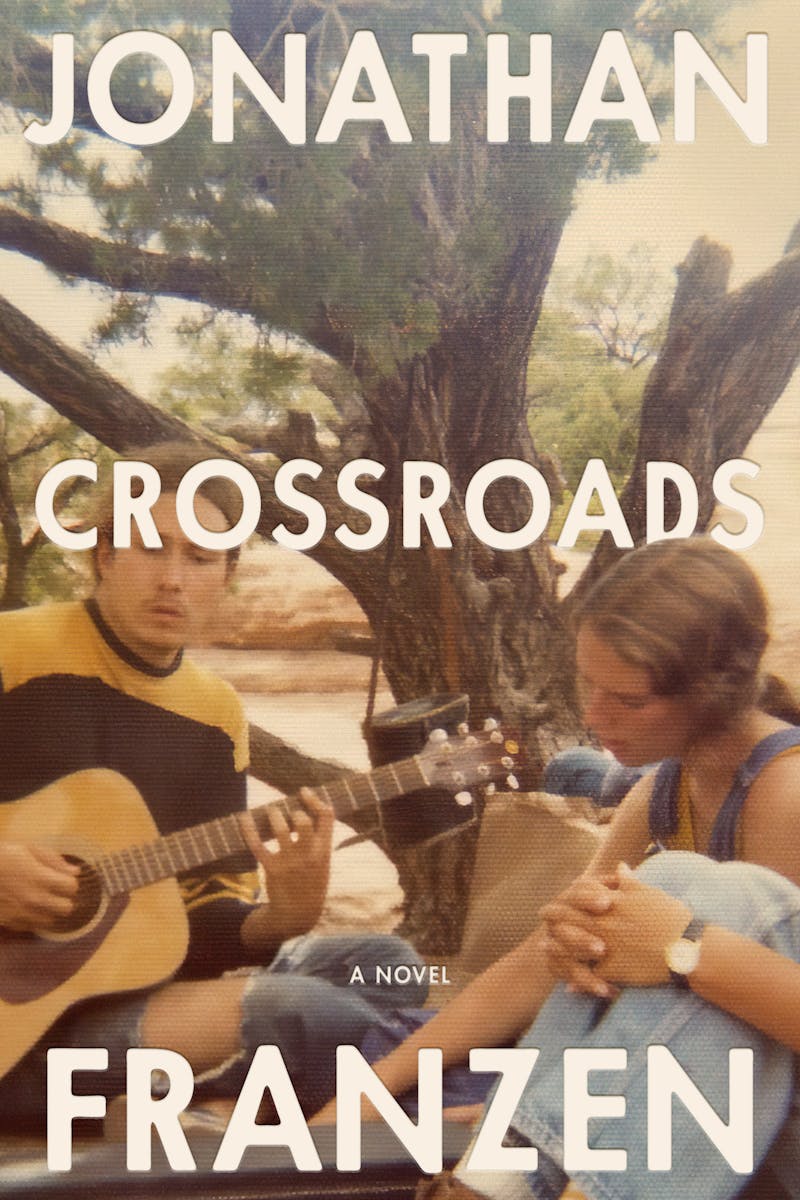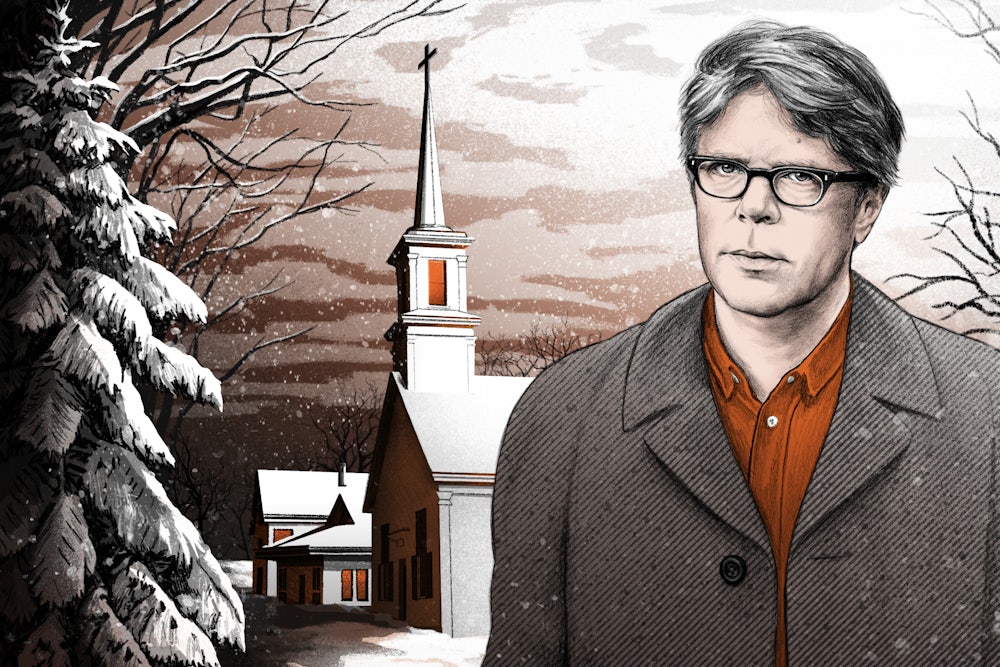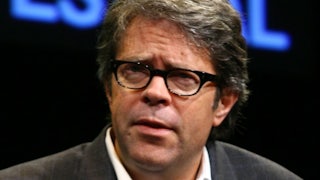Roughly halfway through Crossroads, Jonathan Franzen’s sixth novel, 15-year-old Perry Hildebrandt, pleasantly buzzed on gløgg at a local minister’s holiday party, confronts two men of faith with a difficult question: Is it possible to be truly good? Perry, an unusually intelligent teenager, has himself recently resolved to stop selling and consuming drugs and to be nicer to his older sister, Becky, but he worries that his efforts are ultimately self-serving. If he takes satisfaction in being a good brother, is he really being good, or is he merely being a narcissist? The men are pleased by the complexity and sincerity of his inquiry; Perry is pleased by their pleasure. They discuss the possibility of redemption, the danger of constantly second-guessing one’s motives, and Perry’s fear that he is already “damned.” Their conversation is abruptly brought to a halt when the minister’s wife notices that Perry is drunk, prompting the boy to insult her before breaking down in tears. So much for his resolution.

Crossroads is a novel about how to be a good person. “She herself was good,” Franzen writes in close third-person of 18-year-old Becky, the morning after her first kiss (with another girl’s boyfriend). “I know I’m a bad person,” insists her mother, Marion, a converted-then-lapsed Catholic who suffers from depression. If she were a good person, she tells her therapist, she would be happy that her husband, Russ, the junior minister at a Protestant church outside Chicago, is pursuing a widowed parishioner. Russ, for his part, wonders if an affair—“to joyfully make love with a joyful woman”—might actually be a way of following Christ’s teaching, if it leads “his heart toward forgiveness” of his rival, the church’s youth minister. Clem, the eldest child and an atheist, thinks he knows how to be good: He needs to do the opposite of whatever his father would do, since Clem believes that Russ is a “moral fraud.” Though a pacifist like his father, he drops out of college and hopes to be sent to Vietnam, since he thinks it’s hypocritical to allow a less fortunate young man to fight in his place. Even Frances Cottrell, the “foxy” widow Russ has his eye on, worries that she’s “just not a good enough person” to merit Russ’s attention.
In making goodness the major theme of the novel, the first in a planned trilogy, Franzen is far from alone. Since the rise of the novel in the eighteenth century, novelists have explored the question of how to live morally; some even produced didactic fiction. But the contemporary novelist who addresses moral issues does so in a different environment from her predecessors. The novel may be one of the last few spaces in the culture in which morality is discussed seriously. Church attendance remains low; cultural forums are often partisan; universities are more interested in shaping “the student experience” than a student’s conscience. Writers have long dramatized political and ethical problems, and to some readers they appear well positioned to offer moral guidance.
Franzen seems more than happy to answer the call. For years now, his work has been marked by his creeping fear that the world is in need of an urgent intervention—and why not from him? Since writing his masterpiece, The Corrections, in 2001, he has increasingly moved from considering the psychologically rich world of the family on its own terms to using family drama to gesture at a global crisis that he feels palpably—as a bird-watcher, a Democratic Party donor, and a childless man who enjoys playing doubles tennis in California’s high-risk wildfire zone. An American Dickens, he works in the genre of social realism, crafting major and minor characters who can represent different types of people and divergent political positions. He stages familiar debates—about climate degradation, digital privacy, the student debt crisis, and the secular age—in a familiar literary mode. His ambition is his strength and, sometimes, his downfall: Purity, his 2015 novel about a debt-ridden college graduate who gets entangled with a Julian Assange-like figure, fails because it tries to cover too much ground and takes Franzen too far away from what he knows.
At first, Crossroads seems like a return to form. Much like The Corrections, it’s a novel tightly focused on a Midwestern family. But tonally and thematically, the novels are quite different. There are fewer family memories in Crossroads, less skewering of Midwestern manners, and a whole lot less humor. Crossroads is also a historical novel, Franzen’s first. It’s set in the early 1970s, an era of political turmoil, robust social movements, and intergenerational strife—in other words, an era much like our own. This is a savvy choice: It allows him to stage conversations about politics and morals without aligning his characters with any current ideological group. Where The Corrections was a deeply secular book, Crossroads has a strong religious presence. The novel’s first section is called “Advent,” its second, “Easter.” The characters preach and pray. They ask God for guidance. They are, for the most part, utterly sincere about their faith.
Crossroads is a different mode, even a different genre for Franzen, as it explores a world-ordering system with less satire and more earnestness. And unlike his last three novels, Crossroads isn’t exactly social realism. It’s closer to a novel of ideas, though it’s not quite this either. Unlike a more typical novel of ideas, such as J.M. Coetzee’s Elizabeth Costello, there are no lectures or staged debates. Characters are more than mouthpieces, although they and their discussions of being good are relatively flat. On some level, Franzen seems to know this, as the novel’s plot ultimately undercuts its philosophizing. The irony of Crossroads is that it’s a novel of ideas about the inadequacy of ideas—a book full of people thinking that dramatizes the danger of too much thought.
It’s always helpful to evaluate a writer’s work in light of what he’s trying to accomplish, and, luckily for us, Franzen is remarkably open about his purpose and his method. In a 1996 essay for Harper’s, Franzen articulated his goals as a novelist: He aimed to create work that would, as Flannery O’Connor once put it, “embody mystery through manners.” Franzen glosses “mystery” as “how human beings avoid or confront the meaning of existence” and “manners” as “the nuts and bolts of how human beings behave.” “What’s frightening for a novelist today,” he continued, “is how the technological consumerism that rules our world specifically aims to render both of these concerns moot.” From today’s vantage point, Franzen’s fears seem quaint: He was worried about television replacing books and “leaf-blowers replacing rakes.” He couldn’t have foreseen smartphones and social media.
In The Corrections, he managed to nail both the mystery and the manners. The decline of Alfred, the once-feared family patriarch, is illuminating and moving—a true confrontation with “the nature of existence.” When it comes to manners, Franzen gets so much right: the repressive tendencies of a mother like Enid, who would rather gulp down wine in secret than ask her daughter for another “splash”; the love that Gary, the eldest child, now a father himself, develops for “mixed grill,” to him the height of luxury; and the impulsive romantic choices made by Denise, the beloved baby of the family, in part because she’s trying to make everyone happy. The novel creates a social world but does much more than that: It conveys the power of imperfect familial love. I’ll never forget the description of Alfred, incontinent and barely capable of forming a sentence, seeing his second son, Chip, on his doorstep on Christmas Day and greeting him several times in a row, “his face blazing with joy.” One almost wishes it weren’t so easy to please one’s parents, that it were harder than simply showing up.
In the novels Franzen has written since, there are fewer mysteries and too many manners. Freedom (2010) opens with a catalog of the habits of Twin Cities gentrifiers: “Were the Boy Scouts OK politically?” asks the narrator. “Was bulgur really necessary? Where to recycle batteries?” The trend continues in Purity, which is far too detailed about social worlds that are far from Franzen’s own experience—Communist East Germany in the 1980s, for instance. Reading these novels, we learn what cars people drive and what search engines they use and how much rent they pay and to whom, but we’re rarely surprised or moved by their plights. As a result, Franzen’s fiction has seemed increasingly thin, like an ink stamp used again and again until it leaves only an outline of its original image.
Crossroads brings back the mystery and dispenses with many of the manners. While the characters sport painter’s pants and long hair, and occasionally allude to “women’s lib” and Gloria Steinem, the novel doesn’t investigate the social world of the 1970s. Franzen has shifted his attention to more existential concerns: How can people be good if they’re born sinners? Can they truly forgive themselves and each other, or is that a task best left to Christ?
The plot of the novel and the dialogue among the characters suggest varying possible answers to these questions. Marion, the representative of Catholicism, punishes herself relentlessly for her sins: She had premarital sex! She had an abortion! She failed to prevent her father’s suicide! She argues that this is appropriate: “I know you think it’s sick to blame myself,” she says to her therapist, “but I think it’s healthier spiritually.” Russ, a Protestant minister with social justice leanings, has a less binary understanding of sin. Adultery is sinful, yes, but isn’t his wife’s zealous self-hatred another kind of sin? Couldn’t the appearance of a younger, attractive woman be God’s way of offering him a second chance—and who is he to refuse divine forgiveness? (Russ’s self-justifications and self-exonerations are the closest Franzen comes in the novel to psychological acuity.) Becky, who thinks she has two direct encounters with Christ over the course of the novel, represents a version of evangelical Christianity. She embraces the prosperity gospel—she has few qualms about accepting a $13,000 inheritance from her aunt and spending it mostly on herself—and prizes her virginity. When her parents claim her inheritance in order to pay for Perry’s misdeeds, Becky cuts them out of her life. At times, the novel feels like a crash course in comparative religion: One can imagine the book’s ideal reader drawing a Venn diagram and noting places where various doctrines overlap.
After lots of discussion and much family conflict, the novel eventually lands on two related ideas about goodness. The first is that thinking constantly about being good is antithetical to being good. The mind is too supple; it’s too easy to find reasons to do what you want to do anyway. The more time Russ spends thinking about why he might be morally justified in seeking romance outside his marriage, the less attention he pays to Perry, who obviously has a drug problem, one that ends up costing his family in every sense. Obsessing about one’s sinfulness isn’t great either: Marion, too, loses track of her children and her marriage during her depression and then again during a kind of manic phase, when she leans in to her worst impulses. Even Rick Ambrose, the beloved youth minister who is Russ’s bête noire, is too self-conscious to be a good model for the moral life. “All I can see is you having it both ways,” Russ complains during one confrontation with Ambrose. “Being an asshole and congratulating yourself on your ‘honesty’ about it.”
The cure for all this thinking, we learn, is to perform hard physical labor under punishing conditions. In the novel’s “Easter” section, the church’s youth group, Crossroads, goes on a service trip to the Navajo Nation in Arizona, on the theory that suburban teenagers would benefit spiritually from digging wells for those less fortunate than themselves. Russ himself spent time with the Navajo in his twenties, when he was avoiding military service in World War II. The Navajo are portrayed as straightforward, ascetic, deeply connected to the earth, and free from some of the neurotic tendencies that plague people like Russ and Marion. “Better to be like the Navajo, the Diné, as they called themselves,” thinks Russ at one point. “The Diné had nothing.… But spiritually they were the richest people he’d ever known.”
We might be suspicious of this characterization—Russ isn’t the most reliable observer—if Franzen didn’t reinforce this idea of the materially starved-but-spiritually rich indigenous people near the novel’s end, when Clem frees himself from his adolescent “moral absolutism” by living with and working for an indigenous family in the mountains of Peru. “Neither having nor seeking a larger motive, he found one in the highlands,” Franzen reports. Clem’s time farming in the mountains doesn’t grant him complete clarity, but he begins to understand how silly some of his earlier moralizing was.
There’s a critique to be made here about neocolonialism and the white man’s fantasy of the exotic Other, but I’ll leave that to another critic. What strikes me about Franzen’s vision of spiritual uplift is its relation to physical—not mental—exertion. God may be all-knowing, but the body has its own wisdom. When Russ and Marion finally forgive each other and heal their marriage, it’s not through talking or praying—they try both of these things—but through making love. Under the right conditions, and with the right intentions, physical pleasure isn’t sinful, but rather, as Marion puts it, “a gift from God.”
Of all the characters in Crossroads, it is the unbeliever, Clem, who best embodies this idea of redemption through hard physical work. Alone in the Andes, he lives an “elemental existence,” like a monk. He’s freed from empathy and conscience: “empathy was a luxury a day laborer couldn’t afford.” His days blend together and become routine: “He woke and worked, drank chicha and slept in a shed with the Cuéllars’ donkey.” He’s a being of pure motion, and of brute, physical need.
One day in March, he leads the donkey into the mountain forest to gather firewood. “He was amazed that the hardwoods could survive at all at such an altitude,” Franzen writes. “They had small, silvery leaves, twigs encrusted with lichen, branches hairy with epiphytes and tortured in their angles, as though they’d been thwarted at every turn by the harshness of their environment.” Awed by the trees, Clem wishes he weren’t “hacking at them with a machete.” On his way back, he notices that the soil of the tree-cleared land is “badly eroded, less water-retentive, than the loam in the forest.” But Clem, like his fellow laborers, is cold and hungry and in need of firewood. He doesn’t dwell on the ethics of forest-clearing, nor does he consider alternatives. Like Tolstoy’s Levin, who, in one of Anna Karenina’s most memorable scenes, experiences his “most blissful moments” threshing among peasants, Clem dwells in the bliss of unconscious action. He rarely stops to think about what his work is doing to the forest, and what the future of this community, and this planet, might be.
“It was only hard work when he had to break off the motion, which had become unconscious, and to think,” writes Tolstoy of Levin in the fields. It is certainly liberating to take leave of the conscious mind and to dwell entirely in the physical world. But if it’s hard to stop thinking obsessively, it may be harder still to think honestly and deliberately about the consequences of one’s actions. This is what Clem, returning to his family at the novel’s end, attempts to do: to think through problems, without being obsessive or doctrinaire. The novel ends with his pondering an ethical decision, his choice to be revealed in a future book.
Luckily for Clem, the stakes aren’t as high as they might be. In Crossroads, it’s still 1972. Nearly 50 years later, as Franzen well knows, temperatures in Arizona will soar north of 110 degrees and stay there for days on end. Franzen has his own ideas about what actions one might take to address the worsening climate crisis—he wrote them up in The New Yorker in 2019, to a largely hostile reception—but for now, he’s keeping quiet. Crossroads may not be a return for Franzen, but it is something like a retreat: from the urgencies of our current moment, and from the ways that they warp our literary discourse. The historical moment that Crossroads depicts—of asking big, existential questions, or of working hard to avoid having to—feels definitively like the past. But Franzen has promised not to linger in this earlier era: He’s indicated that the trilogy will eventually describe the 2020s. One hopes that by the time this third book comes out, we’ll have collectively found ways to be—that is, to do—good.






